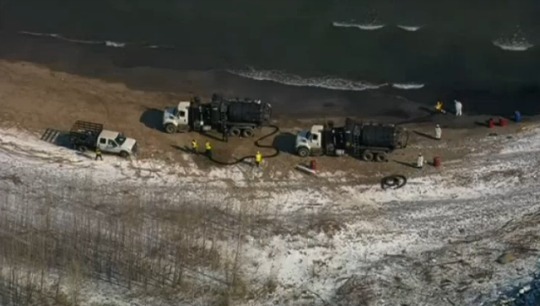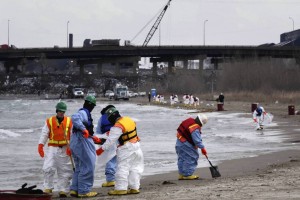Anne C. Mulkern, E&E reporter
Published: Monday, April 14, 2014
Companies involved in offshore oil drilling in federal waters along
California’s coast should voluntarily test for chemical leaks and
release the information, a state lawmaker said Friday.
Providing water quality data would bolster people’s faith that oil
companies want to prevent pollution, Assembly member Das Williams (D)
told industry representatives at an Assembly Select Committee on
Coastal Protection hearing in Santa Barbara, Calif.
California’s S.B. 4, which passed last year, requires base line
testing of water near sites where hydraulic fracturing and other well
stimulation treatments are used, including state waters. But the law
doesn’t apply in the ocean controlled by the federal government.
“If the regulatory structure of S.B. 4 provides that extra level of
safety, and frankly, testing and verification, so therefore
accountability, why would your industry not voluntarily agree to
adhere to those standards in federal waters?” Williams said. “Why
would you not provide that testing data to state regulators? There’s
nothing stopping you from adhering to state regulations in federal
waters.
“Would you do it?” he added.
The inquiry took place at the informational hearing focused on
offshore drilling that uses hydraulic fracturing. Throughout
California, city and state officials are examining rules related to
fracking operations. In the Legislature, S.B. 1132, which would
temporarily ban hydraulic fracturing and other unconventional oil
drilling, last week passed out of its first committee in the state’s
Senate (EnergyWire, April 9).
That same day, the board of supervisors in Butte County, 80 miles
north of Sacramento, in a 4-1 vote directed staff to come back with an
ordinance that would bar fracking. There have been similar votes
seeking moratorium ordinances in Los Angeles and Culver City. Nearby,
Carson last month imposed a ban on all oil drilling.
Williams’ question Friday came after Dan Tormey, while speaking on
behalf of the California Independent Petroleum Association (CIPA),
supported new state rules on water.
“With S.B. 4 and the addition of water quality monitoring, I do think
that’s a good idea,” Tormey said, “to measure what the base-line
conditions are and then to see afterward whether those have been
affected.”
Williams then asked about voluntarily providing the data as it relates
to drilling in federal waters.
“It’s an unfair question,” replied Peter Candy, an attorney also
representing CIPA. “You would have to ask individual operators.” Those
drilling platform operators would need to talk to federal officials,
Candy said, adding that there currently are movements toward those
conversations.
‘Prove good faith’
“We don’t need them if you guys voluntarily decided to do it,”
Williams said, which triggered applause from the audience. “If you
really wanted to prove good faith to the public, you could decide to
do that.”
Candy said that it “would go operator by operator. It’s difficult for
us to sit up here today and answer for individual operators.”
Craig Johns, representing the Western States Petroleum Association
(WSPA), said that S.B. 4’s provisions on water testing focus on
protecting groundwater. Ocean water isn’t used for drinking, he said.
Additionally, he said, EPA monitors for any adverse impacts on the
aquatic environment from offshore drilling.
Williams responded sharply.
“I think on behalf of fishermen and swimmers and surfers and
beachgoers of this county and the state, seawater does have a
beneficial use,” even if it’s not used for drinking water, though
that, too, is changing, he said, referring to desalination.
The California Coastal Commission began probing offshore fracking last
year after a news report revealed that regulators had allowed fracking
in the Pacific Ocean at least a dozen times since the late 1990s. The
Associated Press unearthed the data through a Freedom of Information
Act request.
In waters controlled by the federal government, there are 23 platforms
with outer continental shelf (OCS) plans granting approval for
exploration. A dozen individual wells have done some form of fracking
in the last 25 years, Alison Dettmer, chief deputy head of the Coastal
Commission’s Energy and Ocean Resources division, told lawmakers.
The agency has limited power when it comes to federal waters, she
said. Its purview is limited to evaluating whether activities are
consistent with state law.
Discharges to the ocean are prohibited in state waters but are allowed
and practiced in a number of federal waters, the Coastal Commission
has said previously. The agency plans to send U.S. EPA a letter
requesting that the agency modify its permits so that drilling
platform operators that plan to discharge would submit to an
additional Coastal Commission review, Dettmer said.
Assemblymember Mark Stone (D), chairman of the Select Committee on
Coastal Protection, at the hearing noted that he had seen in his
background materials that the oil and gas industry rejects that the
commission has review authority over OCS plans.
Dettmer said that it’s “a complicated question.”
“We’re going to have to go case by case to look at the individual OCS
plans,” Dettmer said, explaining that the agency would be evaluating
whether each initial plan “actually anticipated at that time doing any
form of well stimulation.”
Federal vs. state jurisdiction
During questioning later, Stone asked Candy — representing CIPA —
his view of the Coastal Commission’s authority. Candy said that CIPA’s
position isn’t that the state agency “lacks all authority to do
consistency reviews.”
But, Candy said, “in cases where you’ve got an established facility
and an approved OCS plan, then the commission needs to be wary of
infringing upon” the jurisdiction of the Bureau of Safety and
Environmental Enforcement and the Bureau of Ocean Energy Management.
Federal regulations give those agencies “exclusive jurisdiction” for
determining what falls within the scope of an OCS plan versus what
would require significant revision, which would trigger a commission
consistency review, he said.
“This industry is highly regulated,” Candy said. “The protections are
in place.” The Coastal Commission should be ensuring that “the
regulators are doing their jobs,” he said, “but not requiring
consistency review every time an operator proposes to hydraulically
fracture a well.”
Stone responded that “the point of consistency review is that
oversight over a federal agency” to “ensure that the federal action is
not jeopardizing coastal resources.”
Interior Department representatives turned down a request to testify
at the hearing, Stone said.
Environmental groups, meanwhile, urged more protections.
Brian Segee, staff attorney with the Santa Barbara-based Environmental
Defense Center, said that the Santa Barbara channel is rich with
marine life that includes threatened and endangered species. There are
bluefin, humpback and killer whales, porpoises, dolphins, southern sea
otters and hundreds of other fishes, birds and invertebrates, he said.
Fracking releases harmful air pollution, uses large amounts of water,
could increase risk of earthquakes and, by producing more oil, hurts
efforts to reduce climate change, Segee said.
In addition, he said, some companies are using hydrochloric and
hydrofluoric acid in wells and should fall under the definition in
S.B. 4 for well stimulation. But there’s an industry attempt to
curtail S.B. 4’s scope by exploiting an exclusion for “routine well
cleanout work, routine well maintenance and routine removal of
formation damage due to drilling.”
“Until a moratorium is enacted … it is imperative that attention be
paid to this critical issue and attempt to circumvent the plain
language and intent of S.B. 4,” Segee said.
Special thanks to Richard Charter


